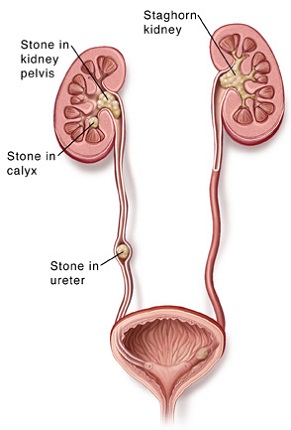They say that if you’ve never experienced kidney stones before, you’ve never known the true meaning of pain. The pain brought about by kidney stones is so excruciating that some would even swear it was worse than childbirth.
 Why Do Kidney Stones Hurt So Bad?
Why Do Kidney Stones Hurt So Bad?
Kidney stones are crystal formations usually made up of minerals, the most common of which is calcium. The stones begin as sand like particles that can grow to over an inch. Stones that are about a quarter of an inch small will be able to pass through the urinary system without causing much problems. However, as the stones grow bigger, they can get stuck in the ureter or may not be able to leave the kidney without medical intervention.
To understand why kidney stones hurt so badly, you’ll first need to understand the urinary system. The urinary system begins with the kidneys. The kidney removes waste products from the fluids in the body and processes them into urine to be removed from the body.
Urine will flow down small tubes called the ureters. The ureters are about 25-30cm long and 3-4mm in diameter. The ureters are not flexible but they do have muscles that can produce spasms.
After passing the ureters, urine will be accumulated in the bladder until such time it is removed from the body.
There are three reasons why kidney stones hurt so badly.
The first is because the stones may try to travel through the ureters causing blockages along the way. Since the ureters have pain receptors, the blockages will create a significant amount of pain.
Second, the ureters will recognize that a blockage has occurred and in response, they will try to remove the blockage by creating spasms forcing the blockage out of the tube. These spasms can also be severely painful as well.
The third reason is if the stones prevent urine from flowing down the ureters, urine will accumulate in the kidney. The kidney itself does not have pain receptors, but as pressure builds up, this can affect the tissues surrounding the kidneys that do have pain receptors.
The degree and location of the pain produced by kidney stones will depend on where the stones are located. If the stones are in the ureters, pain is usually felt at the sides and back of the body.
If the stones are blocking the ureters where they are connected to the kidneys, then pain can be so severe that a person may not even be able to stand at all. On a scale of 1 to 10, the pain will definitely reach a 10. Pain will usually radiate from the groin area down to the thighs as well.
When the stones reach the bladder on their way out through the urethra, pain will usually be concentrated at the groin area.
If you have kidney stones, you may experience pain that comes and goes. That’s because the pain caused by kidney stones usually occur in cycles of around 10 to 30 minutes. The pain may become so intense at one moment and appear to subside after several minutes. Unfortunately, unless the condition is treated, this cycle will continue until such time the pain can no longer be bearable.
References:
https://kidneystones.uchicago.edu/why-do-kidney-stones-cause-pain/
https://newsnetwork.mayoclinic.org/discussion/mayo-clinic-q-and-a-why-are-kidney-stones-so-painful/
https://www.everydayhealth.com/why-kidney-stones-cause-much-pain-when-it-goes-away/
